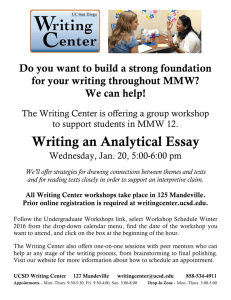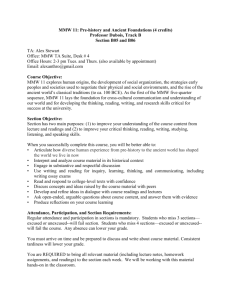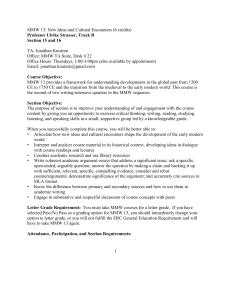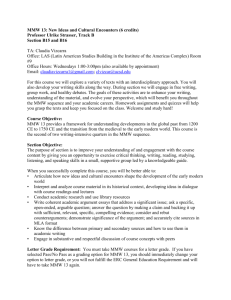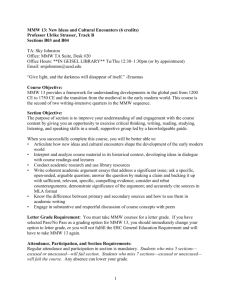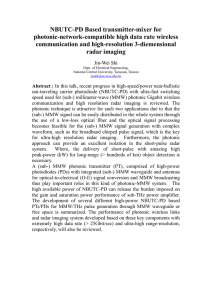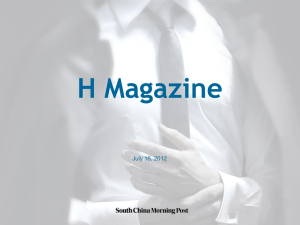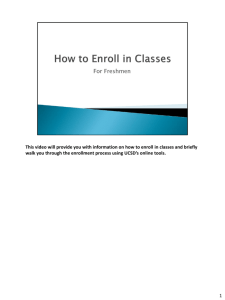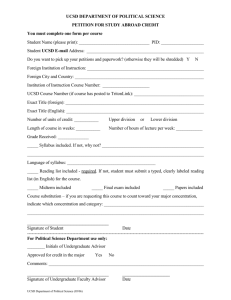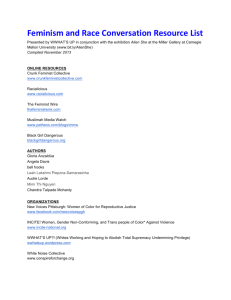MMW 11 Syllabus: Pre-history & Ancient Foundations
advertisement
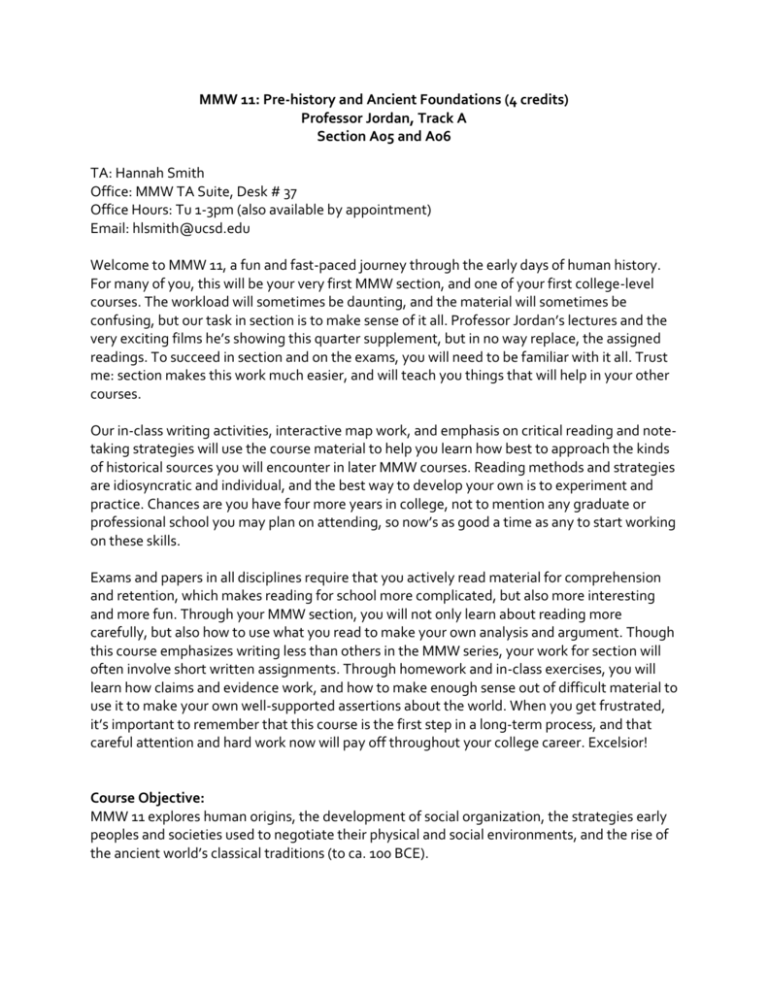
MMW 11: Pre-history and Ancient Foundations (4 credits) Professor Jordan, Track A Section A05 and A06 TA: Hannah Smith Office: MMW TA Suite, Desk # 37 Office Hours: Tu 1-3pm (also available by appointment) Email: hlsmith@ucsd.edu Welcome to MMW 11, a fun and fast-paced journey through the early days of human history. For many of you, this will be your very first MMW section, and one of your first college-level courses. The workload will sometimes be daunting, and the material will sometimes be confusing, but our task in section is to make sense of it all. Professor Jordan’s lectures and the very exciting films he’s showing this quarter supplement, but in no way replace, the assigned readings. To succeed in section and on the exams, you will need to be familiar with it all. Trust me: section makes this work much easier, and will teach you things that will help in your other courses. Our in-class writing activities, interactive map work, and emphasis on critical reading and notetaking strategies will use the course material to help you learn how best to approach the kinds of historical sources you will encounter in later MMW courses. Reading methods and strategies are idiosyncratic and individual, and the best way to develop your own is to experiment and practice. Chances are you have four more years in college, not to mention any graduate or professional school you may plan on attending, so now’s as good a time as any to start working on these skills. Exams and papers in all disciplines require that you actively read material for comprehension and retention, which makes reading for school more complicated, but also more interesting and more fun. Through your MMW section, you will not only learn about reading more carefully, but also how to use what you read to make your own analysis and argument. Though this course emphasizes writing less than others in the MMW series, your work for section will often involve short written assignments. Through homework and in-class exercises, you will learn how claims and evidence work, and how to make enough sense out of difficult material to use it to make your own well-supported assertions about the world. When you get frustrated, it’s important to remember that this course is the first step in a long-term process, and that careful attention and hard work now will pay off throughout your college career. Excelsior! Course Objective: MMW 11 explores human origins, the development of social organization, the strategies early peoples and societies used to negotiate their physical and social environments, and the rise of the ancient world’s classical traditions (to ca. 100 BCE). As the first of the MMW five-quarter sequence, MMW 11 lays the foundation for developing the thinking, reading, writing, and research skills critical for success at the university. The early history you learn in this course is also essential for understanding the later developments you’ll study in your further MMW courses. Section Objective: Section has two main purposes: (1) to improve your understanding of the course content from lecture and readings and (2) to improve your critical thinking, reading, writing, studying, listening, and speaking skills. When you successfully complete this course, you will be better able to: • Articulate how diverse human experience from pre-history to the ancient world has shaped the world we live in now • Interpret and analyze course material in its historical context • Engage in substantive and respectful discussion • Use writing and reading for inquiry, learning, thinking, and communicating, including writing essay exams • Read and respond to college-level texts with confidence • Discuss concepts and ideas raised by the course material with peers • Develop and refine ideas in dialogue with course readings and lectures • Ask open-ended, arguable questions about course content, and answer them with evidence • Produce reflections on your course learning Attendance, Participation, and Section Requirements: Regular attendance and participation in sections is mandatory. Students who miss 3 sections— excused or unexcused--will fail section. Students who miss 4 sections—excused or unexcused-will fail the course. Any absence can lower your grade. You must arrive on time and be prepared to discuss and write about course material. Consistent tardiness will lower your grade. You are REQUIRED to have access to all relevant material (including lecture notes, homework assignments, and readings) to the section each week. We will be working with this material hands-on in the classroom. All of these things will impact your final section grade, in addition to Homework, Quizzes, In-Class Work: Our section meets on Tuesday, but the work for MMW will require that you keep up with the reading and lecture material all week long. I will be doing a few things to help remind you to stay on top of all this crazy stuff: Homework Assignments focusing on what you’ve read and how you’ve read it. For every section you will turn in either copies of your notes or a written summary of the material. Quizzes on lecture materials and assigned readings. Just a warning: I love maps, so these will be easier if you pay attention to the Haywood Atlas. In-Class Work will be focused on creative writing assignments that will not be scored. Here I just want to see what you’re thinking about the material. Grading: Section counts for 10% of your overall course grade. I break your section grade up into 4 parts: Attendance (40%) Homework (20%) Quizzes (20%) In-class writing assignments (20%) Letter Grade Requirement: You must take MMW courses for a letter grade. If you have selected Pass/No Pass as a grading option for MMW 11, you should immediately change your option to letter grade, or you will not fulfill the ERC General Education Requirement and will have to take MMW 11 again. Classroom Environment: No laptops, cell phones, or other electronic devices, please. I want your attention on me and your classmates. Listen respectfully, instead of checking your email and facebook, and you’ll get way more out of section. Office Hours My office hours are Tuesday 1-3, in the TA Suite, cubicle 37. I think seeing students really brightens up the place, and is certainly more interesting than my own work, so I encourage you to come. The only person who likes seeing students more than I do is Professor Jordan. His office hours are before lecture on Mondays and after lecture on Wednesdays, and his office is room 282 in the Social Sciences building, just east of the Asante classrooms. You can also always email either of us to make an appointment outside of regular office hours. Course Resources: MMW11 Homepage: http://roosevelt.ucsd.edu/mmw/courses/MMW11.html David K. Jordan’s Magical Mystery MMW11 Tour, a fun and necessary part of this course: http://www.dkjordan.net/mmw/mmw.html. UCSD Library: http://libraries.ucsd.edu/ Excellent search engine for books and journal articles, Melvyl: http://ucsd.worldcat.org UCSD Writing Center: http://writingcenter.ucsd.edu/ The Cornell Note-taking System (in case you need help with note-taking): http://lsc.sas.cornell.edu/Sidebars/Study_Skills_Resources/cornellsystem.pdf Students with Disabilities: Students requesting accommodations for this course due to a disability must provide a current Authorization for Accommodation (AFA) letter issued by the Office for Students with Disabilities (OSD), which is located in University Center 202 behind Center Hall. Students are required to present their AFA letters to Faculty and to the OSD Liaison in the department in advance so that accommodations may be arranged. Contact the OSD for further information: 858.534.4382 (phone) osd@ucsd.edu (email) http://disabilities.ucsd.edu (website) Academic Integrity: You are responsible for the honesty and integrity of your academic work at UCSD. The University has a strict policy prohibiting cheating of any kind. If you are suspected of cheating, you will be required to meet with an academic coordinator, who will them discuss your case with the professor. If the professor charges you with misconduct, the professor will determine the penalty for your grade in the course, which can range from deductions to failing the paper, section, or the course. Then you will have to meet with the Dean of Student Affairs, who will determine additional penalties, which can range from failing the course and taking an academic integrity seminar to suspension to expulsion. Throughout this process, a hold will be put on your grade. Even a first offense can result in a quarter’s suspension, and the standard sanction for a second offense is suspension or permanent dismissal from the university. Any instance of academic misconduct can be recorded in a student’s file. Such a record might interfere with a student’s acceptance into law, medical, or graduate school, or might make that student ineligible for positions requiring a security clearance, such as a government internship. In brief, the University’s Policy on Integrity of Scholarship states that students are expected to complete the course in compliance with the instructor’s standards. No student shall engage in any activity that involves attempting to receive a grade by means other than honest effort; for example: 1. No student shall knowingly procure, provide, or accept any unauthorized material that contains questions, or answers to any examination or assignment to be given at a subsequent time. 2. No student shall complete, in part or in total, any examination nor assignment for another person. 3. No student shall knowingly allow any examination or assignment to be completed, in part or in total, for himself or herself by another person. 4. No student shall plagiarize or copy the work of another person and submit it as his or her own work. 5. No student shall employ aids excluded by the instructor in undertaking course work or in completing any exam or assignment. 6. No student shall alter graded class assignments or examinations and then resubmit them for regarding. 7. No student shall submit substantially the same material in more than one course without prior authorization. Please read the full Policy: http://students.ucsd.edu/academics/academicintegrity/policy.html. If you have any questions, ask me.
